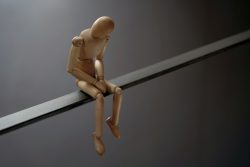Recently, I wrote about the biological impact of PTSD. You can read the first article of the series here.
This week I want to look at what you can do if you have a friend or loved one who you think is suffering or has been diagnosed with PTSD. Specifically, in honor of Father’s Day I’m going to write about helping the brave men in our lives, who are often fathers and soldiers. Statistically, in the military women are more likely to suffer from PTSD, but women are also more likely to seek treatment than men. Culturally, men are taught to be strong and brave, characteristics that are reinforced in the military. Not only are men less likely to get treatment or talk about their symptoms with loved ones, they are more likely to suffer from angry or violent outbursts, as well as drug or alcohol abuse. Let’s look at what you can do to help a loved one who is suffering from PTSD.
Research
If a family member is diagnosed with cancer, what is the first thing you do? Research. Whether it’s asking the doctor five billion questions or reading medical journals, you want to know everything you can about the disease so you can find the best way to treat it. PTSD is no different. In order to understand the diagnosis, you have to research it. Read first hand accounts on blogs, news articles, books or research journals. Read through the information on the VA’s National Center for PTSD, click on the links of studies, journals and other resources listed on the site. In the military we are taught to know our enemy. You can help your loved one by knowing their enemy.
Write
In grad school, I taught a creative writing class at the Balboa Naval Hospital in San Diego. It was one of the most rewarding and challenging experiences in my life, because I know that it helped some of the vets start writing through their demons. Writing can be a very healing process. Buy your loved one a blank journal and a writing book for healing, like Writing out the Storm or Writing as a Way of Healing (I used both of these for my class). He/she might decide to share their writing with you or others, but be respectful as it is a very personal project and they might not wish to share what they write. While teaching this class, one young Marine told me that he would sit and write for hours and at the end of it just deleted the file. This was his healing process. It will be different for everyone individually. If you are having difficulty dealing with a loved one who is withdrawn or depressed as a result of PTSD, it can be beneficial for you to keep a journal as well. You may choose to share your writings with your partner/loved one or keep it personal.
Encourage
Remember, men are less likely to talk and address their feelings. Whether it’s biological or cultural doesn’t matter right now, getting them help does. As a veteran, I can tell you it’s very difficult to talk about things that happened in the military to people who were not in the military. Trying to get an appointment at the VA can be equally as frustrating. Outside of the VA there are also Vet Centers that provide a broad range of counseling, outreach, and referral services to eligible veterans in order to help them make a “satisfying post-war readjustment to civilian life.” Technically they are part of the VA, but fall under a different chain of command. I can personally speak for their services. The counselors and employees are all veterans and provide a very warm and safe environment for vets struggling to readjust. This isn’t just for OIF/OEF vets, any veteran from WWII and Korea to today can seek service there. Also, since 2003, Vet Centers furnish bereavement counseling services to surviving parents, spouses, children and siblings of service members who die of any cause while on active duty, to include federally activated Reserve and National Guard personnel. For counseling and other services, this can be a good alternative to trying to fight for an appointment at the VA.
Protect Yourself and Your Family
Members of the military are trained to kill. Violence becomes second nature even though it goes against human nature. We are desensitized to violence by chanting, “Kill, kill, kill,” during every drill, meal and exercise. If someone you know is having flashbacks, nightmares or is extremely jumpy and owns a weapon, which most veterans probably do as a self-defense measure, make sure they keep the weapon unloaded. After being trained and experiencing combat, individuals are conditioned to immediately reach for their weapon and kill. This reaction can lead to an accident in the home if someone is simply up in the middle of the night looking for a snack or using the bathroom. If a weapon is unloaded, the time it takes to load the weapon is time for the veteran to gain situation awareness. Encourage your loved one that he/she can still protect the house, but this three-second delay can be enough to stop a gut reaction from accidentally firing the weapon.
Anger is also a natural reaction to readjusting and carrying the memories and feelings of PTSD. If your loved one acts violently towards you or your children, leave immediately. It does no good for anyone to stay in that situation. Anger doesn’t always lead to violence, but can make it difficult to communicate. The National Center for PTSD suggests setting up a time-out system using the following tools:
- Agree that either of you can call a time-out at any time.
- Agree that when someone calls a time-out, the discussion must stop right then.
- Decide on a signal you will use to call a time-out. The signal can be a word that you say or a hand signal.
- Agree to tell each other where you will be and what you will be doing during the time-out. Tell each other what time you will come back.
- While you are taking a time-out, don’t focus on how angry you feel. Instead, think calmly about how you will talk things over and solve the problem.
You can seek counseling together or separate to learn how to deal with anger management.
Conclusion
Remember, PTSD doesn’t just affect veterans of the Iraq war and other current conflicts/wars. My sister recently started raising chickens for eggs and meat and when our grandfather stopped by he said he couldn’t help butcher the animals. “I made a promise that I would never harm a living being after the war,” he told her. Grandpa was a tank driver in WWII and was in the Battle of the Bulge. Growing up he never mentioned the war, but after I joined the Marines he told me a handful of stories. Each time his face changed and I could tell he has carried something with him since that time. Let’s encourage our veterans to seek the help they might need so they don’t have to carry their burdens any longer. By creating or helping them find a safe environment to talk, we can help them find the road to freedom from the anxiety, anger, obtrusive thoughts, and other burdens that come with experience war or trauma.
In the coming weeks I’ll be looking into PTSD in female veterans, how our hormones might affect PTSD and if there are any differences between PTSD in male and female veterans.
More on PTSD:
The Gift of Fear
VA Benefits for Female Vets
Memorial Day Reflection
















This is an excellent article. I am a female Active Duty Marine with PTSD. My PTSD does not stem from combat; it stems from a combination of a vehicle crash (which resulted in a Traumatic Brain Injury, TBI) and sexual assault. Still, I would be very interested in a dialogue about PTSD in women.
For my part, I know that the training we underwent that was meant to desensitize us to violence actually had the opposite effect on me. I am now much more sensitive and disturbed by violence of any kind than I believe the majority of the US population is.
This article is a very consice capture of some very good advice. The writing is an excellent idea, and while the focus should be on the healing aspect of it and no one should ever share or be pressured to share before they are ready, I would also encourage those who can, even if anonymously, to do so. Reading first hand accounts of others who are going through the exact same thing that you can’t seem to explain to your own loved ones can be amazingly cathartic.